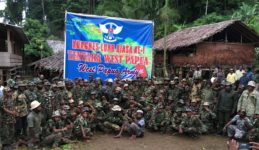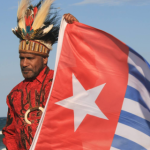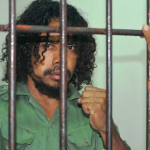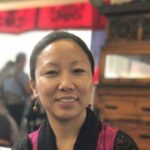West Papuans Have United to Reclaim Their Nation

The United Liberation Movement for West Papua (ULMWP) announced last week that the three main West Papuan military factions have united under the one single command. And the newly-formed West Papua Army is now operating under its political leadership.
The three military factions signed the Vanimo Border Declaration on 1 May, which marked 56 years since Indonesia commenced its repressive occupation of the Melanesian country in 1963. And it follows the three major West Papuan political groups forming the ULMWP in 2014.
ULMWP chair Benny Wenda explained in a statement that the “international community can now see without a doubt that we are ready to take over our country”. And the “unified military and political” leadership now form a “state-in-waiting”.
Mr Wenda handed the West Papuan People’s Petition to the UN Human Rights high commissioner last January. Calling for an internationally supervised vote on self-determination, the petition was signed by 1.8 million West Papuans, which accounts for 70 percent of the Indigenous population.
And with newfound unification, the ULMWP asserts that it’s ready to “peacefully reclaim” its country, and bring about an end to Jakarta’s “divide and rule” tactics, along with its almost six decades-long “genocide, ecocide and torture” regime.
United in common struggle
“It’s very important before we go forward at the international level,” said ULMWP spokesperson Jacob Rumbiak. “We must make sure for a win in politics that we are under one command. We must have one voice: in military, intelligence, diplomacy and politics.”
The former political prisoner and self-imposed exile told Sydney Criminal Lawyers that now the military is under clearly defined control, Indonesia can no longer cast aspersions about West Papuan troops being rogue separatists.
And Mr Rumbiak made clear that the unified military now forms a legitimate self-defence force. It has “a military role of protection” and it also serves as “defence of our home”. The army can protect the “civilians of Papua, and also, the civilians of Indonesia”.
Disparate no more
The military factions that have joined to form the West Papua Army are the West Papua Revolutionary Army (TRWP), the West Papua National Army (TNPB) and the West Papua National Liberation Army (TPN.PB).
Rumbiak explained that local military forces first formed in the capital Manokwari in April 1964. This followed the 1962 New York agreement, which resulted in the UN briefly administering the region – after the pull out of former colonial ruler the Netherlands – and then handing it over to Indonesia.
The initial military wing began its armed resistance against the Indonesian military in July 1965. However, by the end of the 1970s, the West Papuan armed forces had splintered to into three different military factions.
The Act of No Choice
The United Nations gave control of the region to Indonesia on the proviso that Jakarta hold a self-determination referendum to let the West Papuan people decide on whether they wanted to remain under the control of the foreign power or become an autonomous nation.
And following widespread resistance to Indonesian rule, the UN brokered Act of Free Choice was held in 1969. However, the Indonesian military selected just 1,026 West Papuans to vote on the question of independence. And under threat of death, they all chose to remain a colony.
After consolidating control, Jakarta began a transmigration program, moving Indonesian people from densely populated areas, like Java, to West Papua. This has resulted in only 49 percent of the local population today being Indigenous, whereas in 1971, 96 percent of residents were West Papuan.
Around 500,000 West Papuans have been killed as a result of Indonesia’s harsh military rule, with countless others having been incarcerated. And Jakarta has further divided West Papua, by formally splitting the region into two provinces – West Papua and Papua – in 2003.
Atrocities in Nduga
The Indonesian military began a violent crackdown in the Nduga region of occupied West Papua last December. And according to Mr Rumbiak, the conflict that’s displaced around 35,000 villagers continues on to this day.
Indonesia sent 600 troops into the central highland region following the 2 December shooting of at least 17 construction workers, who were working on the Trans-Papuan Road project in the local area. The West Papua Liberation Army later claimed responsibility for the attack.
And in reprisal, the Indonesian military has conducted numerous assaults on local villages, some of which have been completely evacuated. And there are also reports that white phosphorus – a chemical weapon that causes severe burns – has been used by Jakarta despite an international ban.
“The situation is worse. The military operation is still very big,” Mr Rumbiak explained. “The area is closed to local and international journalists.” But, he added reports were still emerging by way of the local churches in the region, which is not far from the controversial Freeport mine.
Coming independence
The ULMWP will now be working with Vanuatu to secure the support of two-thirds of the 193 states represented at the United Nations, with the aim of bringing Jakarta to the negotiating table and holding a new national vote on self-determination.
In July 2010, the parliament of Vanuatu voted to support West Papuan independence at the UN General Assembly. And at last October’s 73rd meeting of the assembly, Vanuatu, the Marshall Islands and Tuvalu called for action on West Papua.
Compiled in 2017, West Papuan People’s Petition is solid proof that the local people want the right to freely vote on their independence. Indeed, those who signed the document risked both their freedom and their lives in doing so.
The Widodo government initially banned the petition. And when it was first presented to the UN Special Committee on Decolonisation, it claimed the document was a hoax. But, now with a unified front, West Papuan leaders assert that their voices can no longer be denied.
“The UN transferred West Papua to Indonesia without UN principles,” Mr Rumbiak concluded. “So, we want to bring West Papua back to the UN with the two-thirds majority to solve the problem based on UN principles at the headquarters in New York.”







